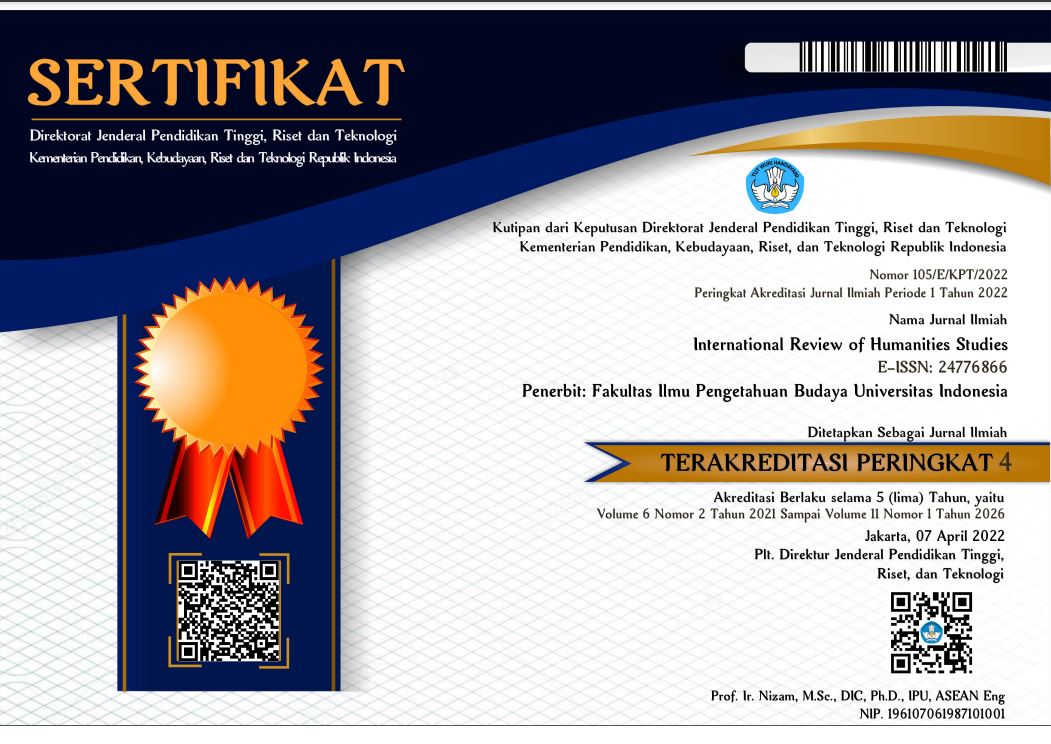International Review of Humanities Studies

Abstract
This study examines how working mothers negotiate her gender role and strategize in facing the condition when domestic and public sphere exist in one space called home after the outbreak COVID-19 pandemic in Indonesia. The research questions are ” how far does working from home give an impact in changing patriarchal gender relation and distribution of work division at home?”, and “to what extends women modify their home functions in coping with COVID 19 pandemic condition and in minimizing patriarchal authority at their own home?” The research uses qualitative methods, including in-depth interviews and questioner filling, and focuses on samples of 30 middle class working women, living in Jabodetabek (Jakarta, Bogor, Depok, Tangerang, Bekasi) area. This study argues that as the impact of Covid pandemic condition, the middle class working mothers, who have been “forced to go back” to their homes, seemingly, use their homes as “struggling places” to renegotiate the old patriarchal role divisions and unequal gender/power relations. Moreover, it is argued that their homes, to some extends, are used as learning sites for gender equality values, and modified to fulfill their extended functions: as domestic, work, and social spheres.
References
Alon, T.M., Doepke ,M., Olmstead-Rumsey, J., and Tertilt, M. (2020). The Impact of Convid-19 on Gender Equality. Working Paper 26947 National Bureau of Economic Research. Massachusetts, Cambridge. Retrieved from http://www/nber.org/papers/w26947 on April 13, 2020.
Clancy, A. (2020). On mothering and being mothered: a personal reflection on women’s productivity during COVID-19. Gender, Work & Organization 27 (5) Special Issue: Feminist Frontiers Special Issue: Gendered labor and work, even in pandemic times, 857-859.
Dowler, L., J. Carubia & B. Szczygiel. (2005). Introduction: gender and landscape: renegotiating morality and space. In Lorraine Dowler, Josephine Carubia & Bonj Szczygiel Gender and Landscape: Renegotiating morality and space, London and New York: Routledge.
Elfira, M. (2017). The contribution of Minangkabau women, who established inter-cultural marriages, in creating a new identity of Minangkabau diaspora. In Isbandi Rukminto Adi and Rochman Achwan (eds). Competion and Cooperation in Political and Social Sciences: Proceedings of APRiSH 2016: Topics in Social and Political Sciences (pp.175-180). Taylor & Francis.
Guney-Frahm, I. (2020). Neoliberal motherhood during the pandemic: some reflections. Gender,
Work & Organization 27 (5) Special Issue: Feminist Frontiers Special Issue: Gendered labor and work, even in pandemic times, pp.847-856.
Guy, B & Arthur, B. (2020). Academic motherhood during COVID-19: navigating our dual roles as educators and mothers. Gender, Work & Organization 27 (5) Special Issue: Feminist Frontiers Special Issue: Gendered labor and work, even in pandemic times, pp. 887-899.
Hochschild, A.R. (1989). The second shift: Working parents and the revolution at home. New York: Viking Penguin.
Hollows, J. (2007). The Feminist and the Cook: Julia Child, Betty Friedan and Domestic Femininity. In Emma Casey and Lydia Martens (eds.) Gender and Consumption: Domestic Cultures and the Commercialisation of Everyday Life, Hampshire: Ashgate publishing Limited,pp.33-43.
Indriani, D and Sugiasih, I. (2018). Dukungan sosial dan konflik peran ganda terhadap kesejahteraan psikologis karyawati PT. SC. Enterprises Semarang. Proveksi 11(1), pp. 46-54.
Kandiyoti, D. (1988). Bargaining with Patriarchy. Gender and Society, Vol.2, No.3, Special Issue to Honor Jessie Bernard (Sep., 1988), pp.274-290.
Kite, M. (2001). Gender Stereotype. In Judith Worell (Ed.). Encyclopedia of Women and Gender, Two-Volume Set: Sex Similarities and Differences and the Impact of Society on Gender (pp 561-570). San Diego: Academic Press.
Lopez, N. (2003), Hopeful Girls, Troubled Boys: Race and gender disparity in urban education,
New York and London: Routledge.
Reinharz, S. (1992). Feminist Methods in Social Research. New York: Oxford University Press.
Sigiro, A.N, Primaldhi, A, Takwin, B. (2018). Ekonomi perawatan dan beban kerja ibu rumah
tangga di Indonesia. Jurnal Perempuan 23 (4), pp. 249-258.
Tjandraningsih, I. (2018). Bekerja, berumah Tangga dan berorganisasi: sistem patriarki dalam tiga ruang hidup perempuan. Jurnal Perempuan 23 (4), pp. 227-233.
Wahid, U and Lancia, F. (2018). Pertukaran peran domestik dan publik menurut perspektif wacana sosial Halliday. Mediator: Jurnal Komunikasi 11 (1), 106-118.
Zuhdi, S. (2018). Membincang peran ganda perempuan dalam masyarakat industri. Jurnal Hukum Jurisprudence 8 (2), pp. 81-86.
https://nasional.kompas.com/read/2020/03/15/14232961/jokowi-saatnya-kerja-dari-rumah-belajar-dari-rumah-ibadah-di-rumah
https://www.malaymail.com/news/malaysia/2020/03/31/ministrys-mco-advice-to-women-wear-make-up-while-working-at-home-speak-to-s/1851985
http://bebas.kompas.id/baca/gaya-hidup/2020/03/29/ketika-harus-sekolah-di-rumah/
Recommended Citation
Elfira, Mina; Wibawarta, Bambang; Esther, Rouli; and Febriand, Fandra
(2021)
"WORKING FROM HOME: WOMEN BETWEEN PUBLIC AND DOMESTIC SPHERES AFTER THE OUTBREAK OF COVID-19,"
International Review of Humanities Studies: Vol. 6:
No.
3, Article 6.
DOI: 10.7454/irhs.v6i3.1333
Available at:
https://scholarhub.ui.ac.id/irhs/vol6/iss3/6
Included in
Anthropology Commons, Art and Design Commons, Creative Writing Commons, Cultural Heritage Law Commons, Education Law Commons, Film and Media Studies Commons, History Commons, Intellectual Property Law Commons, International and Area Studies Commons, Legal Writing and Research Commons, Linguistics Commons, Museum Studies Commons, Philosophy Commons, Urban Studies and Planning Commons


